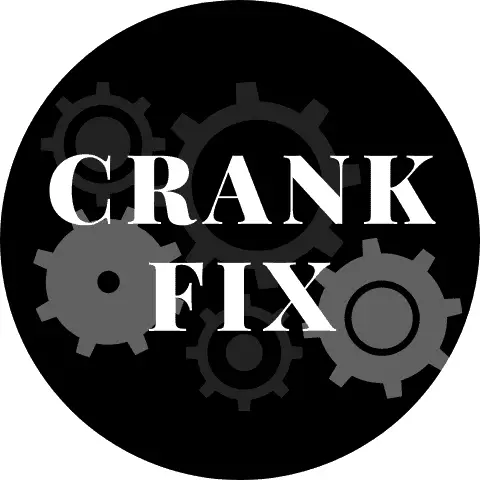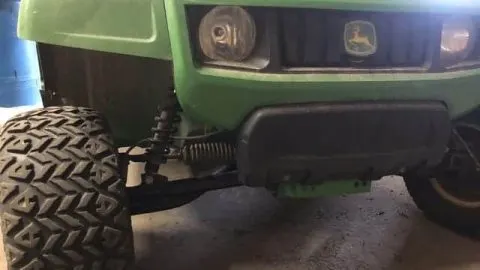If your John Deere Gator won’t crank up but produces a clicking sound when you turn on the ignition key, you need to troubleshoot and find the cause. Only then can you fix the problem and get your gator moving.
Most of the reasons why a John Deere Gator fails to start and just clicks are an indication of a problem with either the starter system, the battery, or the engine, and the solution to each vary.
We’ll go through each of these causes and discuss what to do about them. Let’s begin.
Starter Problems
The starter is an integral part of any car engine. It forms part of the system that allows a car to crank up. The starter motor and starter solenoid make up this system together with other connections, including the starter gear and starter control terminal.
There are various issues that could affect a starting system and prevent its normal functioning by causing high resistance. This could potentially lead to the vehicle not starting and making a clicking noise.
Here’s a brief explanation video from YouTube of how the click no start problem occurs. It’s in reference to cars but the principle outlined is relevant to our project:
Starter Motor Issues
The first potential issue is a dead starter motor. This can occur as a result of a faulty triggering mechanism. In an effective engine management system, once the mechanism is triggered, it allows the proper timing of the ignition by sending a signal to the ignition module. A faulty signal in your John Deere Gator will impair the normal functioning of the entire engine system.
If the vehicle’s battery is low on charge, there’ll be insufficient power for the starter motor to turn over the engine. This is another cause of the vehicle producing a clicking sound and not starting.
Another issue that can occur is the failure of the starter motor itself. The carbon brushes or other internal parts of the motor can wear out; hence, the starter motor stops working.
Other possible starter problems include a loose starter connection, dirty connections, worn out or damaged starter system parts.
The Fixes
For issues with the starter motor, it’s advisable to get a technician to handle the matter. A worn-out or damaged motor will require replacement. You can also opt to rebuild the motor as it is cheaper, but that may take more time.
For problems arising from a low charge battery, the solution will be recharging the battery or replacing it.
Dirty or loose connections will require cleaning and replacing the connectors.
Faulty Starter Solenoid
The starter solenoid is attached to the starter motor. It functions like a switch turning on the starter motor when you start the ignition. The solenoid then turns off after the engine starts and therefore causes the starter motor clutch to retract.
Generally, solenoids are pretty sturdy, but a few can develop faults, particularly in older vehicles. If your Gator’s solenoid is faulty, it’ll either fail to transfer power from the battery to the starter motor or fail to kill the power after the engine starts.
Causes of a faulty solenoid are varied. One of them is bad wiring. Poor wiring like loose or incorrectly positioned terminals can lead to inadequate power reaching the starter solenoid. It can also cause shorting, which is quite dangerous.
Corrosion of the electrical contacts is another cause of a faulty solenoid. This happens when excessive moisture gets inside the unit. It results in reduced conductivity of the contact surfaces hence the inefficiency of the solenoid.
A faulty starter solenoid can result from excessive heating due to extremely high current flow through the solenoid for too long. The high temperatures melt the soldering in the contacts.
There is also the issue of over-tightening of bolts and other fasteners. This can happen, especially when using tightening tools. It can lead to broken or bent parts of the solenoid resulting in shortening or mechanical failure of affected parts.
The Fixes
Before working on fixing your vehicle’s solenoid, ascertain that it’s the culprit causing your engine not to start. You can do this by testing the solenoid using a multimeter.
For issues with loose terminals, make repairs to ensure all connections are intact.
As for major damages to the starter solenoid, you will need to replace the solenoid with a new unit.
Battery Problems
If you hear a really fast clicking noise when turning the ignition key to your John Deere Gator without it starting, then think of the state of its battery.
Dead Battery
Low voltage or high resistance is often the reason for this symptom. A battery voltage below 12 or 12.45 volts is considered a low voltage. Ideally, when fully charged, the battery should read at least 12.65 volts. But a reading above 12.45 volts is okay and can last a long while.
One of the most common reasons for low voltage is age. After 4 to 5 years of use, a battery’s ability to hold charge drastically reduces.
On the flip side, long periods of disuse (generally a year or more) results in low voltage as well. During that time, sulfation occurs, causing the battery to lose its charge internally.
Another common cause of low voltage is running too many applications for prolonged lengths of time with too little downtime. For example, leaving lights on or playing the radio after the car is shut off.
Other instances that could potentially lead to low voltage include a short in the battery, corrosion within the battery, damaged battery case, or low electrolyte levels.
The Fixes
A damaged car battery should be checked by a technician. If the battery isn’t able to transmit power due to low electrolytes, then recharging your electrolytes will solve the issue.
All in all, the solution to a dead battery is either repair or replacement of the battery. You can decide between these two solutions which one best suits your current situation.
Corroded Battery Terminals
Corroded battery terminals can interfere with your vehicle’s starting system. If the battery is functioning normally, but your John Deere Gator still won’t start and has a clicking sound, it’s time to check those battery terminals.
Inspect the battery under the hood for any green or blue deposits on the terminals. Rust buildup is also something to watch out for. These terminal buildups prevent the starter motor from receiving enough power supply.
The Fixes
The immediate solution to terminal buildups is a thorough cleanup. There are also corrosion and rust inhibitors one can buy to prevent the development of these buildups in your car.
Battery Cable Issues
If both the battery and the starter system are functioning properly, but the connection between the two is wanting, your car will produce the clicking noises and won’t start.
This interrupted connections can be due to frayed wires or loose battery cables.
The Fixes
Mending the frayed wires and repairing loose connections are the solutions to this problem. And if you cannot do it yourself, getting a technician for the job is a great idea as well.
Engine Problems
If the engine of your car seizes, then it will not start, and there will be a clicking noise when you turn on your ignition key. This can be due to a locked up or damaged engine.
Locked Up Engine
An engine can lock up due to a number of reasons:
- The most common cause is insufficient oil. This can occur if there’s something preventing oil circulation or basically running out of oil in the engine.
- Lack of oil and its lubricating property will eventually lead to friction between engine components and possible heat buildup (in extreme cases), causing parts that should be moving to weld together.
- Hydrolocking is another cause of a locked up engine. In this instance, water gets into the combustion chambers, and since it doesn’t compress like air, the pistons cannot move up as usual.
- Freezing during winter can also cause an engine lock-up, especially if you park your car outside in freezing temperatures.
The Fixes
Maintaining the appropriate oil levels is one of the most important steps to avoiding engine lock up.
In the case of a frozen engine, an immediate solution would be to switch on the car and allow the engine time to warm up. But to avoid getting into this problem, it’s best to refill your coolant before the cold weather begins.
Conclusion
To avoid getting yourself in a situation where your John Deere Gator won’t start – just clicks – schedule regular maintenance of your vehicle. Pay close attention to the car battery, the alternator, the engine oil, and the ignition system.

